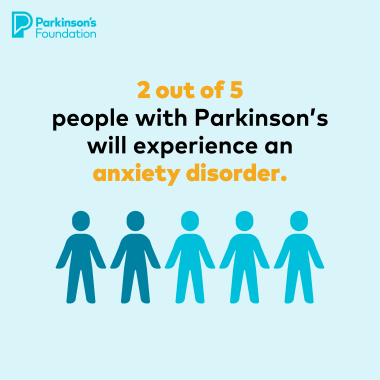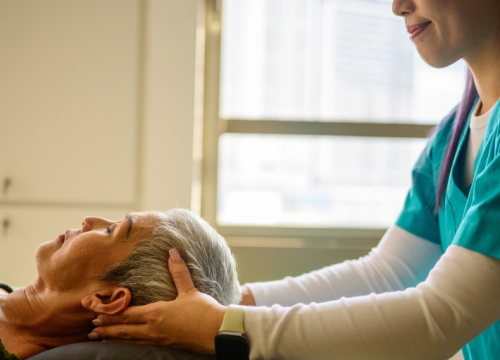8 Practical Ways to Work on Your Mental Health with Parkinson’s

For people with Parkinson’s disease (PD) and care partners, dedicating time to maintaining mental health can feel like its own battle. From the mental exhaustion leading up to a Parkinson’s diagnosis to what can feel like ever-changing symptoms as PD progresses, it’s easy for mental health to not be a priority.
Below we explore eight practical ways to work on your mental health. Most of these can be applied to people with PD and care partners, as both are constantly navigating the complexities of mental health symptoms alongside the physical ones.
Jump to Our Top 7 Mental Health Resources
1. Get to know the science behind the psychological impact of Parkinson's.

Depression, anxiety and apathy are all common Parkinson’s symptoms. In fact, up to 50% of people with Parkinson’s will experience some form of depression. Our research shows that together, depression and anxiety have the greatest impact on the health of people with PD, even more than the movement challenges.
The science behind mood symptoms is that Parkinson’s directly impacts the production of dopamine in the brain. Dopamine plays an essential role in helping the body move smoothly and the brain process emotions.
What can you do? Get to know non-movement symptoms. Learn the signs of depression. Bring up any mood-related symptoms to your Parkinson’s doctor. Together, you can find treatment options that work for you.
Resource that can help: Mood: A Mind Guide to Parkinson's Disease
2. Exercise.
Research shows that exercise and physical activity can not only maintain and improve mobility, flexibility and balance but also ease non-movement PD symptoms. Exercise releases chemicals in the brain such as neurotransmitters and endorphins that make us feel good. It reduces immune system chemicals that can worsen depression, and it increases body temperature, which may have a calming effect.
PD-tailored exercises classes, from non-contact boxing to indoor cycling, are excellent forms of exercise and have the bonus of helping build your PD support system.
Increasing physical activity alone was shown in some studies to improve mood. Walking, gardening, housework, washing the car — any activity that gets you moving can help improve your mood. Even adding small amounts of physical activity throughout your day can be useful.
Resource that can help: Try an on-demand exercise class through our Fitness Friday videos, or call our Helpline at 1-800-4PD-INFO (1-800-473-4636) to find a PD-tailored exercise class near you.
3. Try complementary therapies.
Explore holistic approaches that can support mental wellness in addition to your treatment plan. About 40% of people with Parkinson’s use some type of complementary therapy as part of their regular treatment routine.
Complementary therapies include:
- Exercises, like Tai Chi and Yoga
- Vitamins and Supplements
- Acupuncture
- Meditation
- Massage Therapy
- Medical Marijuana
Talk to your primary care doctor before starting any complementary therapy.
Resource that can help: Top Takeaways About Complementary Therapies and PD
4. Change your diet.
Eating a whole food, plant-based diet, often called the Mediterranean diet, can help you live well with PD. Eat what you need to be happy — but also eat more of the food that is good for your health.
If you have Parkinson’s, every healthy lifestyle change can help. While it can be challenging to eat better, most people make minor diet changes gradually that become major changes over time. Always consult your physician before making major changes.
Resource that can help: Diet & Nutrition page
5. Attend an in-person event and try a new resource.
For everyone, finding the tools that help you cope with stress and anxiety can be a lifelong endeavor. Explore Parkinson’s Foundation resources that can help you get the support you need.
These tools are designed to help empower you:
- Mindfulness Mondays: Take part in guided relaxation techniques to help boost brain power and reduce stress. Explore recorded events.
- Hospital Safety Guide can help you prepare for an upcoming hospital stay.
- Find your local chapter for nearby support groups and exercise classes.
- Explore our PD Library for the PD topic that matters most to you right now.
- Build your community and find a nearby in-person event.
Resource that can help: Resources & Support page
6. For care partners: check in with yourself.
How can I support my loved one with Parkinson’s through mental health changes? How can I support my own mental health? As a caregiver, you have a dual role — taking care of the person with Parkinson’s and taking care of yourself. These roles are equally important! A strong personal support network will help you have an outlet for your emotions and be able to take time off. Call our Helpline at 1-800-4PD-INFO (1-800-473-4636) to find a local caregiver support group.
Regularly check in with yourself. Seek help professionally or from a trusted friend as you need it. Remember to take breaks — utilize people in your life, or external resources, to allow you respite from caregiving.
Resource that can help: Caring for the Care Partner
7. For everyone: Build your mental health support team.
Recognizing your individual emotional needs and building a strong support network that includes mental health professionals is part of a comprehensive plan to navigate PD.
Surround yourself with people who will listen, uplift and encourage you when you need them. Look for support among your friends, family and community. Take the time to find the right therapist. It may be difficult to find one familiar with PD, but those who are specialized in chronic illness, grief, anxiety and depression can often address common feelings and experiences of living with a PD diagnosis.
Resource that can help: Tips for Daily Living: Building Your Mental Health Team
8. For everyone: Call our Helpline for personalized resources and tools.
Our Helpline is here to answer your Parkinson’s questions. Speak to our Helpline specialists to find resources that work best for you or your loved one with Parkinson’s. Regarding mental health, our Helpline can provide referrals to:
- Healthcare professionals.
- Community resources including exercise classes and local support groups.
- Mental health resources.
Resource that can help: Call 1-800-4PD-INFO (1-800-473-4636) or email Helpline@Parkinson.org.
Our Top 7 Mental Health Resources
- Expert Briefing: Mental Health and PD
- Mindfulness Mondays: Take part in guided relaxation techniques to help boost brain power and reduce stress. Explore recorded events.
- Tips for Daily Living: Building Your Mental Health Team
- Episode 118: Managing Mental Health Problems with Parkinson’s
- How to Advocate for Your Mental Health with Parkinson’s
- For Care Partners: Answering the Top Care Partner Questions About Mental Health
- For Care Partners: Caring for the Care Partner
Related Materials
Intimacy and PD
Mood: A Mind Guide to Parkinson’s Disease
Managing Anxiety in Parkinson's
Related Blog Posts


Start 2026 Strong: Simple Resolutions for Better Health
